The parking lot at the new All Persons Trail at the Manchester Cedar Swamp Preserve has been packed nearly every day since it opened last month.
“It's been so overwhelmingly amazing and wonderful and positive,” said Megan Latour, who was part of a team at the Nature Conservancy in New Hampshire that helped bring the new trail to life. “When we opened the trail that day, my face hurt from smiling so much and just the sheer, authentic joy from the community.”
The All Persons Trail is only a few miles from the city’s bustling Elm Street, but it feels a world away. It’s also designed to be more inclusive than traditional nature trails: It’s wheelchair accessible and includes resources for those who are hearing or visually impaired, as well as informational materials in English and Spanish.
Making this accessible trail a reality took three years of work.
Latour and her Nature Conservancy colleagues started by setting up a series of focus groups, or “community conversations,” with Granite Staters who have long been underrepresented in outdoor spaces. To do that, they worked with organizations representing the LGBTQ+ community, Black community, active seniors community and disability community.

“The project overall was really just a way to highlight all of these voices that have often been overlooked in the outdoor recreation sphere,” said Sheila Vargas, who works on government and community relations for the Nature Conservancy.
Those community conversations began shortly before the start of the pandemic, but Vargas said that the shift to remote meetings during the pandemic actually made the forums more accessible — allowing people from across the state to join in safely from their homes. All of that input helped Vargas see why people wanted a trail that was accessible and how to make it possible.
“We didn't want to build a trail that we could just say, ‘Look at us, we built an accessible trail. We're so woke,’” she said. “We wanted to build a trail where we could say, ‘We built this trail and we know it is needed.’”
Latour also said this input was crucial. She said it allowed the Nature Conservancy to base their planning not on guesswork but instead on conscious decisions informed by the communities they wanted to welcome to the trail.
“This was designed by the community, for the community and with the community,” Latour said. “As a result, community members feel such a sense of ownership and investment in what has been created.”

Max Morelli was one of many community partners the Nature Conservancy consulted when developing the trail. Morelli oversees day to day programming at Opportunity Networks, a nonprofit that works to provide educational and vocational opportunities for people with developmental or acquired disabilities. Part of his job includes finding opportunities for their clients to spend more time outdoors.
“I don't think it's crazy to say that this is going to be something that's a life-changing type of place for a lot of people that we work with,” Morelli said of the All Persons Trail. “I'm not really aware of a place where you could get what this trail offers anywhere around us.”
Morelli said the Nature Conservancy welcomed his suggestions on how to make the trail more accessible, like adding rest stops along the route to make it easier to navigate.
For many of the people Opportunity Networks serves, he said, the point of getting outdoors isn’t always about reaching the end of a trail; it’s about enjoying the outdoors as a whole. With that in mind, he said the rest stops and other interpretive elements, like the audio tour or signage, will make any time spent on the trail more enjoyable, whether or not someone completes the whole route.
Morelli was also particularly taken with one point on the trail, about halfway through, that looks out on a lush grove of rhododendrons.
“To give people that opportunity to be able to access those types of things where they otherwise, in a lot of ways, wouldn't be able to… I mean, my jaw was on the ground walking through it,” he said.
Latour said she’s been hearing from people like Morelli who are grateful for the trail on a daily basis. After working with the Nature Conservancy for two decades, she said this project stands out as her most rewarding experience with the organization.
“I feel like this really gets to the heart of finding ways to help people and nature thrive together,” Latour said.








